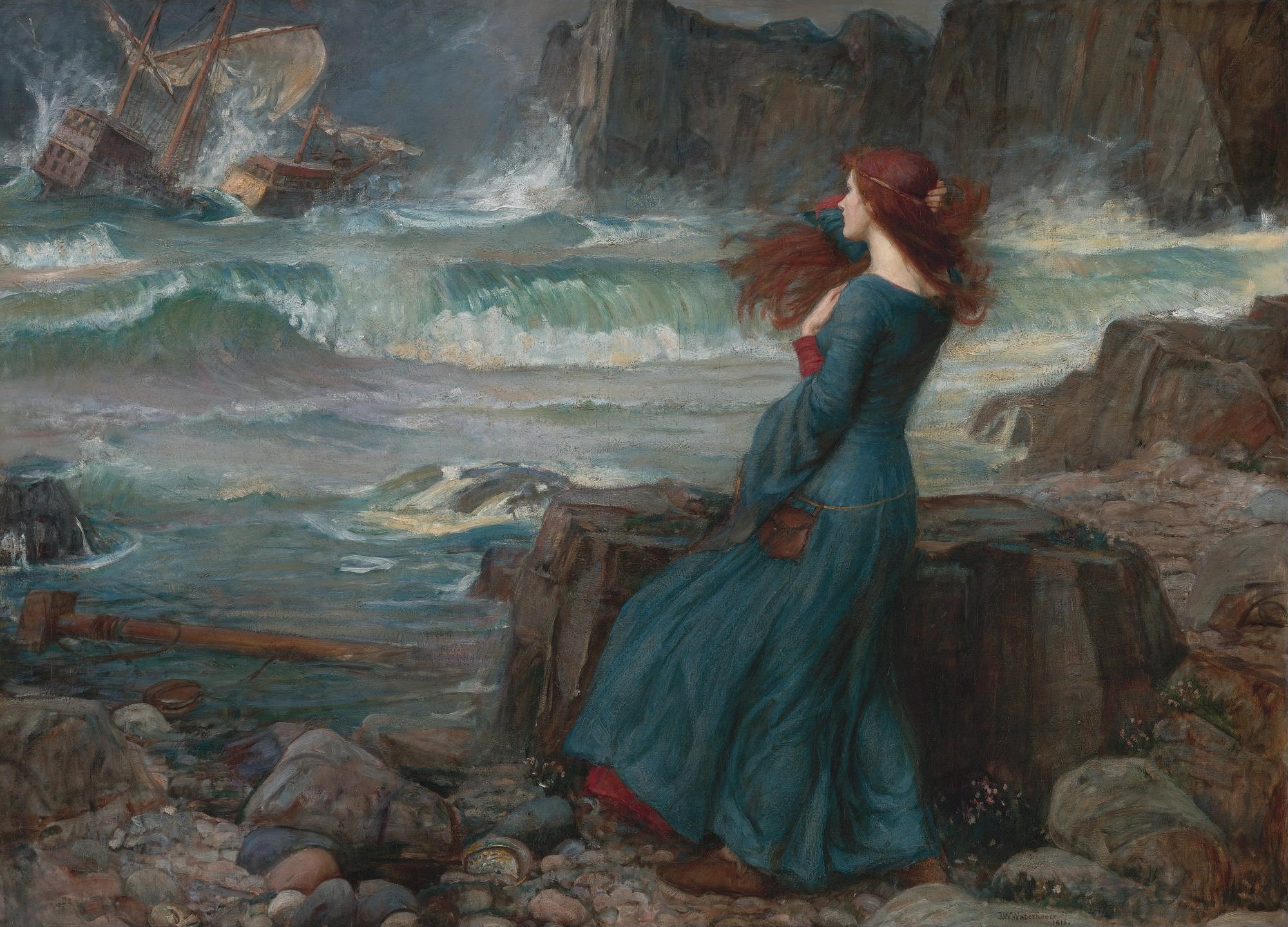“We are such stuff as dreams are made on, and our little life is rounded with a sleep.”
Supposedly written in 1610-11, The Tempest is believed by many scholars to be the last play Shakespeare wrote on his own. Though not very popular with 17th century audiences, it is now considered by many to be one of Shakespeare's greatest works. In some ways, this particular play is concerned with its own nature, and many early scholars have seen it as Shakepeare's farewell to the theater.
The Plot:
After being usurped by his brother, Prospero, the rightful duke of Milan, and his daughter, Miranda, have lived for 12 years on a deserted island. Chance brings those who had overthrown him in the vicinity of the island, and Prospero uses his magic arts to cause a storm that washes everyone ashore and scatters them about the island. This includes his brother, Antonio, Alonso the King of Naples, and the king's son, Ferdinand. With help of his spirit servant, Ariel, Prospero works to bring all of the company back together and reclaim his rightful place as Duke of Milan.
My Review (Caution - Spoilers):
I was pretty familiar with the plot of this play though I had never actually read it. It has several different qualities that set it apart from the typical Shakespearean comedy. I found it to be less laugh out loud, but rather enjoyed the more mystical aspects of it.
As with Macbeth, the atmosphere of The Tempest contributes heavily to the impression it leaves. While the atmosphere of the former is dark and foreboding, the atmosphere of this play is light and mischievous yet tempered by a solemnity. The magic of the two plays also contrast well as the spells and dark omens of Macbeth contribute to horror and evil while Prospero's magic is used mainly for good. I loved the mystical qualities of the play, both playful and solemn. Ariel, as an immortal spirit, brings fun to the story and his tricks and interactions with the villains of the play are often hilarious. As a man approaching the end of his life, Prospero is much more straightforward and his often heavy spirit keeps the play from being in the same vein as A Midsummer Night's Dream. We are much less concerned with characters looking ridiculous than we are in other comedies.
One of the interpretations of the story that I found fascinating was the idea of Shakespeare writing Prospero as himself. This theory has persisted for many years and is accepted by most critics. In this theory, the plot is meant to represent the theater and Shakespeare as magician controls the characters and even the very elements. Yet, like Prospero, Shakespeare is approaching the end of his life and will be letting go of his servants (characters) and his magic arts (writing). "Our revels now are ended. These our actors, as I foretold you, were all spirits and are melted into air, into thin air..." This idea of the magician/playwright giving up his magic and retiring from the public eye is both beautiful and sad. It makes Prospero's final plea to the audience for freedom and release all the more powerful. "As you from crimes would pardon'd be, let your indulgence set me free."
I think this is the most beautiful of the Shakespeare plays that I have read. The free use of magic and song, the mischievousness contrasted with villainy, and the reflections of a person at the end of their life all combine to be something rather extraordinary. Though it may or may not be Shakespeare's final work, it is certainly a fitting send off for history's greatest playwright. A must read for any Shakespeare lover.
The Performance:
Though
reading Shakespeare is fun, it is also important to see it performed.
Shakespeare gives few stage directions and this allows each individual
give their own interpretation of the characters an their actions.
I watched the 2010 film version starring Helen Mirren, Felicity Jones, Ben Whishaw, and Alan Cumming. At first I thought that Prospero becoming Prospera would be distracting, but Mirren gave an excellent performance and played the character brilliantly. All of the acting was wonderful and the CG elements helped keep the "magic" of the play intact. They also did a great job incorporating the many songs of the play, even turning Prospero's epilogue into the end theme. Worth a watch in my opinion.
Do you have a favorite performance of this play? Share it with us in the comments.

















2 comments:
I haven't read The Tempest yet but I watched it acted out in a "Shakespeare in the Park" and I enjoyed it a lot. Hopefully I'll get it read next year.
I've read The Tempest but it wasn't until I saw it acted out at the Globe Theatre that I finally "got" it. Now it's probably my favourite Shakespeare comedy after Much Ado About Nothing. It's funny, it's touching, the characters are fun and memorable, and the language is beautiful :) I wasn't sure whether to bother with the 2010 film but you've convinced me otherwise. I've really enjoyed all of your Shakespeare reviews!
Post a Comment